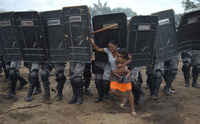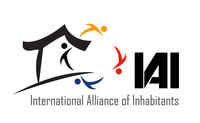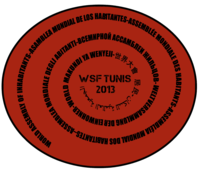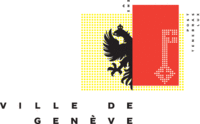3rd Session Program
3rd Session Program, Geneva, 17th to 19th October 2013
Thursday, two conferences and three films
Friday, the International Tribunal on Evictions
Saturday, the Inhabitants March
Thursday 17th October 2013
Towards a permanent ITE
Maison des Associations, Carlson room
8:30 - Opening
Carlo Sommaruga
Cesare Ottolini, IAI global coordinator
9:00 - Moderated round table
Focus on Switzerland & Evictions
ASLOCA
Collectif des 500
Association des Habitants de la Jonction
SURVAP
11:00 - Coffee break
11:30 - Moderated round table
Participatory habitat & ITE: global responses to speculation and for housing security
Pascale Thys, Habitat and Participation, Belgium
Nicolas Kunzler, Forum for Participative Democracy, Switzerland
Jean Rossiaud, Coordinator of the Forum for new global governance
13:00 – Lunch break
14:30 – Guest of Honour speaker:
Raquel Rolnick, United Nations Special Rapporteur on the Right to Adequate Housing, Brazil (video)
15:00 – Preview of video on the struggles against evictions due to housing foreclosures “Taking Over, Taking Back”, 16’ (Jessica Murphy, Elissa Nadworny, USA, 2013)
and an intervention by Rob Robinson, USACAI and NESRI coordinator, New York (video-conference)
16:00 - Conference
The international convergence of the struggles for the Right to Housing
Violations of the Right to Housing for women, World Court of Women, USA (video-conference)
The Day of European mobilisation, Coalition for European Housing Actions (video-conference)
The Conference for the Right to Housing in Tunisia, Soha Ben Slama, conference promoter and IAI coordinator in Tunisia
Move to UNIMAIL, University of Geneva Auditorium NR070 (ground floor)
18:00 - Preview of video on evictions in Romania
“Ne luptam cu morile de vânt” (We fight against windmills), 2013
and discussion in the presence of the director, Chloe Salembier, Belgium
20:00 – Preview of Swiss fictional participatory video, Saharan refugee camp
“Un désert trop petit” (A desert too small) 24’, 2013, in the presence of the director Franck NA
Friday 18th October
ITE SESSION 2013
Maison des Associations, Carlson room
8:30 – Opening of the International Tribunal on Evictions
Members of the Jury:
Cesare Ottolini global coordinator of the International Alliance of Inhabitants, former member of the UN-Habitat Advisory Group on Forced Evictions
Christian Dandres, lawyer at ASLOCA, Member of the Geneva Grand Conseil (Grand Council)
Christiane Perregaux, Human Rights activist, former president of the Geneva Centre de Contact Suisses-Immigrés (Swiss-Immigrant Contact Centre), honorary professor for the University of Geneva
Gordon Aeschimann, associate judge for the Geneva Tribunal des Baux et Loyers (Leases and Rents Tribunal)
Melik Ozden, Europe-Third World Centre from the UN, former associate judge for the Geneva Tribunal des Baux et Loyers, former Geneva Constituent, Member of the Geneva Grand Conseil
Guest of Honour: Raquel Rolnick, United Nations Special Rapporteur on the Right to Adequate Housing, Brazil
9:00 - Presentation of the 5 cases of Housing Rights violations around the world in the presence of the victims, witnesses and dossier rapporteurs
9:00 to 9:40 - Rome, Italy (the tenants, victims of a financial crisis which is beyond them), case presented by the Unione Inquilini
9:40 to 10:20 - Layoune, Western Sahara (corruption and eviction), case presented by Femme au foyer d'origine sahraoui
10:20 to 11:00: Nairobi, Kenya (global headquarters of UN-HABITAT, shameless evictions), case presented by Amnesty International Swiss section
11:00 Coffee break
11:20 to 12:00 - Anata, Jerusalem, Palestine (emergency of a sixth demolition/eviction for the same family), case presented by Israeli Committee Against House Demolitions (ICAHD)
12:00 to 12:40 - Pucallpa, Peru (evictions of indigenous peoples due to mining activity), case presented by Centro de Promocioón y Desarrollo Rural Amazónico (CEPODRA)
12:40 – Summary
13:00 – Lunch break
14:00 -16:00 – Each eviction case studied in the morning is reprised for additional information, contradictory arguments, presentation of documents (official documents, audio-visuals, etc.); testimonies by video-conference; and drafting the first Recommendations.
Move to UNIMAIL, University of Geneva Auditorium NR070 (ground floor)
16:30 – Revision of the cases of forced evictions discussed at the 2011 and 2013 Sessions of the Tribunal on Evictions:
Port Harcout, Nigeria (report by Amnesty International)
Port-au-Prince, Haiti, place Jérémie, (video-conference)
Saint-Petersburg, Russia (video-conference)
S. Paulo, Brazil (video-conference)
and participatory discussions until 20:30.
Result of the 5 cases of Housing Rights violations around the world
21:00 – Closing of the ITE Session
Saturday 19th October 2013
Meet in front of the Buvette des Habitants de l'Ilot 13 (rue Montbrillant)
10:00 to 12:30 - Inhabitants March
Peaceful march accompanied by the music of Erika Baumann and Ruth Frauenfelder
then BASEMENT for the reading of the Recommendations of the 3rd Session of the ITE at Place des Nations.
Maison des Associations:
Exhibition: Inhabitants facing eviction
Organisation:
International Alliance of Inhabitants
World Assembly of Inhabitants
P A L C, Productions à la Chaine
With the collaboration of Amnesty International Swiss section
and the support of the City of Geneva
Information:
The ITE will take place in two locations: Maison des Associations, rue des Savoises (Carlson room) and UNIMAIL, University of Geneva (Auditorium NR070).
Fully public filming.
French/English/Spanish translation.
Free entry.
Videos can be viewed at www.alachaine.ch
Email: tie2013@habitants.org
http://www.tribunal-evictions.org/
What is the International Tribunal on Evictions?
The International Tribunal on Evictions is an opinion tribunal established by civil society organisations for the World Zero Evictions Days – for the Right to Habitat to practically and interactively discuss the question of forced evictions around the world. The Tribunal relies on their expertise and on the appointment of a competent and approved Jury, as well as on the International Covenant on Economic, Social and Cultural Rights (ICESCR) and other instruments of international law in order to pass judgment on real cases of forced evictions that constitute human rights violations.








